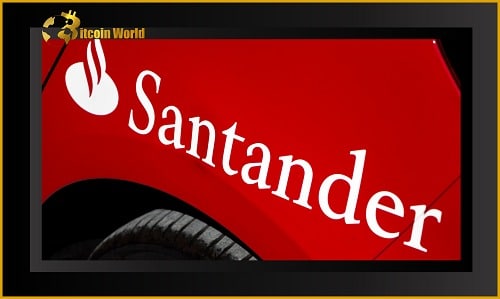Hold on to your hats, crypto enthusiasts and finance aficionados! Traditional banking is taking another step into the digital asset world, and this time, it’s happening in Argentina. Santander, a well-known financial institution, has just announced a groundbreaking move: crypto-backed loans secured by agricultural commodity tokens. Yes, you read that right – crypto loans are branching out beyond Bitcoin and Ethereum!
Santander and Agrotoken: A Partnership Blooming in Argentina
In a strategic alliance that’s turning heads, Santander is teaming up with Agrotoken, an innovative startup, to roll out these novel loans specifically for the agricultural sector in Argentina. This isn’t just another crypto headline; it’s a significant development that could reshape how loans and agriculture intersect in a crypto-savvy world.
So, what exactly are these ‘agricultural commodity tokens’? Let’s break it down:
- Grain Tokens Explained: Agrotoken has created stablecoins that each represent one ton of stored grain. Think of them as digital certificates of deposit, but for soybeans (SOYA), corn (CORA), and wheat (WHEA).
- Value Tied to Real-World Commodities: Each token’s value is pegged to the US dollar price of the corresponding commodity. This provides a stable and tangible link to real-world assets, making them less volatile than many cryptocurrencies.
- Pilot Program Success: Santander isn’t jumping in blindly. They’ve already successfully completed a pilot program with Argentinian producers to test the waters and ensure the product’s viability.
This initiative is particularly interesting because it bridges the gap between traditional finance and the burgeoning world of decentralized finance (DeFi), specifically in a region known for its agricultural prowess.
How Does it Work? The Proof of Grain Reserve (PoGR)
You might be wondering, how can a bank confidently offer loans based on digital grain tokens? The answer lies in Agrotoken’s ingenious “Proof of Grain Reserve” (PoGR) mechanism.
Here’s a simplified look at the PoGR process:
- Grain Reserve Confirmation: Farmers deposit their grain in certified storage facilities.
- Oracle Verification: Oracles (data providers that bridge blockchains and the real world) verify the grain reserve.
- PoGR Certificate Generation: This verification process creates a PoGR certificate, essentially a digital proof of the stored grain.
- Token Creation: Based on the PoGR certificate, Agrotoken creates “cryptograins” (tokens like SOYA, CORA, WHEA) and deposits them into the farmer’s digital wallet.
- Collateral for Loans: These cryptograins then serve as collateral for loans from Santander.
Agrotoken emphasizes a “multichain infrastructure,” meaning their platform operates across multiple blockchains like Ethereum, Polygon, and Algorand. This approach aims for flexibility and potentially lower transaction costs.
Beyond Loans: What Can Farmers Do with Grain Tokens?
The utility of these grain tokens extends beyond just securing loans. Agrotoken outlines various ways farmers can leverage these digital assets:
- Trading and Exchange: Tokens can be traded on crypto exchanges, providing farmers with liquidity and access to the crypto market.
- DeFi Applications: Farmers can potentially use their tokens in various DeFi applications for yield farming or other financial services.
- Direct Purchases: Agrotoken’s website suggests farmers can swap tokens for essential agricultural inputs like seeds, machinery, and fuel.
- Pre-funded Credit Cards: Access to pre-funded credit cards linked to their token holdings offers farmers increased financial flexibility.
Why Argentina? And Why Now?
Santander’s choice of Argentina for this innovative loan product isn’t random. Several factors likely play a role:
- Argentina’s Agricultural Significance: Argentina is a major agricultural exporter, particularly for soybeans, corn, and wheat. This makes it a prime location for grain-backed financial instruments.
- Inflationary Environment: Argentina has been grappling with high inflation. In November, Santander announced a significant $225 million investment in the country. Reuters reported that inflation recently hit a nine-month high. In such an environment, alternative financial tools and hedging mechanisms can be particularly attractive.
- Crypto Adoption: While not explicitly stated, Argentina has shown a growing interest in cryptocurrency, possibly due to economic uncertainties. This could create a more receptive environment for crypto-based financial products.
The Bigger Picture: Crypto and Traditional Finance Converging
Santander’s foray into crypto-backed agricultural loans is a compelling example of how traditional financial institutions are starting to embrace and integrate with the crypto world. This move highlights several key trends:
- Real-World Asset Tokenization: Tokenizing real-world assets like commodities is gaining momentum, offering new avenues for financing and investment.
- DeFi and Traditional Finance Collaboration: The lines between DeFi and traditional finance are becoming increasingly blurred, with collaborations emerging to leverage the strengths of both worlds.
- Innovation in Lending: Crypto and blockchain technology are paving the way for innovative lending solutions, potentially increasing efficiency and accessibility.
Challenges and Considerations
While this development is exciting, it’s important to acknowledge potential challenges:
- Regulatory Landscape: The regulatory framework for crypto assets and crypto-backed loans is still evolving globally and within Argentina. Clarity and supportive regulations are crucial for wider adoption.
- Market Volatility: Although grain tokens are pegged to commodity prices, market fluctuations in both crypto and commodity markets could still pose risks.
- Adoption and Education: Farmers need to understand and adopt these new digital tools. Education and user-friendly platforms are essential for successful implementation.
Conclusion: A Fertile Ground for Crypto Finance?
Santander’s venture into crypto-backed agricultural loans in Argentina is a noteworthy step towards integrating cryptocurrency into mainstream finance. By leveraging grain tokens and partnering with Agrotoken, they are tapping into a significant market and offering innovative financial solutions to the agricultural sector. Whether this initiative will flourish and expand remains to be seen, but it undoubtedly signals a growing appetite for crypto innovation within traditional banking and opens up exciting possibilities for the future of finance in agriculture and beyond.
Related Posts – Ferrari joins the NFT universe through a collaboration with a Swiss…
Disclaimer: The information provided is not trading advice, Bitcoinworld.co.in holds no liability for any investments made based on the information provided on this page. We strongly recommend independent research and/or consultation with a qualified professional before making any investment decisions.


